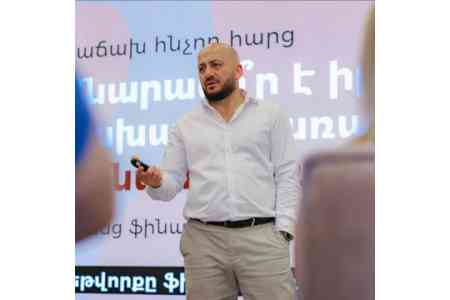


ArmInfo. Co-founder, president of the Mantashyants Entrepreneurs Club Vahram Mirakyan once again addressed the topic of "tax terror" and the incompetent work of the inspectors of the State Revenue Committee (SRC) of Armenia. He also voiced his proposals aimed at eliminating the seizure and illegal confiscation of property as a means of pressure on business, and establishing fair and predictable mechanisms for resolving tax and economic disputes. "Anyone who has ever encountered this knows how our police and investigative services work. Or rather, how they do not work. After a crime is reported, either nothing happens, or they are focused on ensuring that there is no report, so that there is no unsolved case.
Now the State Revenue Committee is giving our investigative services a big gift for simulating work. Every year, it sends about a thousand criminal cases against Armenian enterprises to the Investigative Committee, and the Investigative Committee employees feel like Rambo, entering homes or enterprises in masks, intimidating employees and committing other similar anti-terrorist actions. True, in the end, in most cases it turns out that the information was false or the degree of violation was incorrect, but no one cares anymore," Mirakyan writes on social media.
In particular, according to the head of the Matashyants club, about 1,000 enterprises in Armenia become the objects of criminal cases every year, which is a terrifying indicator for the RA. For comparison, in the US, 3-4 thousand criminal cases are initiated against businesses annually, while in the US there are about 30 million enterprises, and in Armenia - about 70 thousand.
In addition, he notes, all entrepreneurs are in a vulnerable position: of illiterate State Revenue Committee inspectors, and on the other - a rude, illiterate and disrespectful investigator with his harsh actions>. And this is despite the fact that, according to statistics, the State Revenue Committee loses most cases in court (about 80% according to Mirakyan), and the results of the of the investigator often do not live up to expectations.
The situation, the expert is convinced, is not only the result of ineffective work, but a crisis of trust: the business community begins to perceive the state not as a protector, but as a threat. In such an atmosphere, investments do not come into the country, new jobs are not created, and the economy weakens from within, he points out. Vahram Mirakyan recalls that recently he, together with Arsen Sardaryan, a lawyer at the LSA law firm, came up with a legislative initiative aimed at resolving the situation. The draft law is currently being discussed with various relevant bodies and has been submitted to the National Assembly Economic Affairs Committee for consideration.
According to the initiative, firstly, it proposes amending Article 290 of the Criminal Code, establishing that the threshold for initiating criminal cases should not be 10 million, but rather 10% of a company's turnover over the past three years, but no less than a certain established threshold. Otherwise, with a threshold of 10 million, criminal cases could be initiated against virtually all companies with a turnover of over 200-300 million, the head of the Entrepreneurs' Club emphasizes.
The second proposal concerns the seizure and return of electronic storage devices. "Since investigators generally don't care about the damage they cause to the country and the economy, they hold onto companies' computers for months and years without returning them. As a result, on the one hand, they paralyze businesses, and on the other, they force them to incur new expenses and purchase computers." According to our proposal, investigators are required to return the information media within three days," Mirakyan points out (the initiators previously stated that they were proposing the following: seizing information only based on a court decision, and then by downloading it to physical media. If it is impossible to extract the information contained on computers, the equipment must be returned within a maximum of three days - editor's note).
And the third proposal is that if a company has cash flows that cover the amount of the obvious violation, then no investigative actions should be carried out without discussing the situation with the business. "We need to change our approach to this issue, otherwise the state will consider all entrepreneurs criminals. The state must perceive entrepreneurs as partners, not enemies. Only then can we build an economic environment based on trust, where both business and the state benefit."
As a reminder, in 2024, the State Revenue Committee of Armenia initiated amendments to the Tax Code aimed at abolishing incentive provisions and establishing stricter criminal liability for tax offenses. The Committee believed that this facilitates the commission of tax crimes, and the legal basis for recognizing exemption from criminal liability through compensation for property damage caused by the crime hinders and prevents the commission of new tax crimes. The initiator proposed establishing a penalty for tax offenses in the form of imprisonment for a term of three years or more, if violations amount to 10 million drams or more. The bill was met with an extremely negative reception from the business community and expert circles.